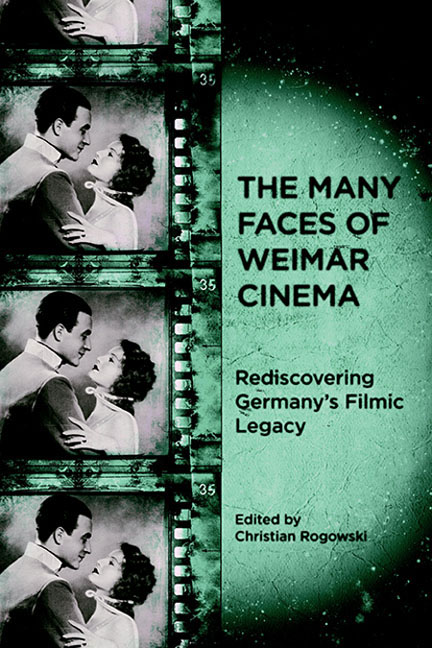Book contents
- Frontmatter
- Contents
- List of Illustrations
- Preface
- Introduction: Images and Imaginaries
- 1 Richard Oswald and the Social Hygiene Film: Promoting Public Health or Promiscuity?
- 2 Unsettling Nerves: Investigating War Trauma in Robert Reinert's Nerven (1919)
- 3 Humanity Unleashed: Anti-Bolshevism as Popular Culture in Early Weimar Cinema
- 4 Desire versus Despotism: The Politics of Sumurun (1920), Ernst Lubitsch's “Oriental” Fantasy
- 5 Romeo with Sidelocks: Jewish-Gentile Romance in E. A. Dupont's Das alte Gesetz (1923) and Other Early Weimar Assimilation Films
- 6 “These Hands Are Not My Hands”: War Trauma and Masculinity in Crisis in Robert Wiene's Orlacs Hände (1924)
- 7 The Star System in Weimar Cinema
- 8 Schaulust: Sexuality and Trauma in Conrad Veidt's Masculine Masquerades
- 9 The Musical Promise of Abstract Film
- 10 The International Project of National(ist) Film: Franz Osten in India
- 11 The Body in Time: Wilhelm Prager's Wege zu Kraft und Schönheit (1925)
- 12 Henrik Galeen's Alraune (1927): The Vamp and The Root of Horror
- 13 The Dialectic of (Sexual) Enlightenment: Wilhelm Dieterle's Geschlecht in Fesseln (1928)
- 14 Babel's Business — On Ufa's Multiple Language Film Versions, 1929–1933
- 15 “A New Era of Peace and Understanding”: The Integration of Sound Film into German Popular Cinema, 1929–1932
- 16 Landscapes of Death: Space and the Mobilization Genre in G. W. Pabst's Westfront 1918 (1930)
- 17 Undermining Babel: Victor Trivas's Niemandsland (1931)
- 18 Unmasking Brigitte Helm and Marlene Dietrich: The Vamp in German Romantic Comedies (1930–33)
- Filmography
- Notes on the Contributors
- Index
10 - The International Project of National(ist) Film: Franz Osten in India
Published online by Cambridge University Press: 29 April 2017
- Frontmatter
- Contents
- List of Illustrations
- Preface
- Introduction: Images and Imaginaries
- 1 Richard Oswald and the Social Hygiene Film: Promoting Public Health or Promiscuity?
- 2 Unsettling Nerves: Investigating War Trauma in Robert Reinert's Nerven (1919)
- 3 Humanity Unleashed: Anti-Bolshevism as Popular Culture in Early Weimar Cinema
- 4 Desire versus Despotism: The Politics of Sumurun (1920), Ernst Lubitsch's “Oriental” Fantasy
- 5 Romeo with Sidelocks: Jewish-Gentile Romance in E. A. Dupont's Das alte Gesetz (1923) and Other Early Weimar Assimilation Films
- 6 “These Hands Are Not My Hands”: War Trauma and Masculinity in Crisis in Robert Wiene's Orlacs Hände (1924)
- 7 The Star System in Weimar Cinema
- 8 Schaulust: Sexuality and Trauma in Conrad Veidt's Masculine Masquerades
- 9 The Musical Promise of Abstract Film
- 10 The International Project of National(ist) Film: Franz Osten in India
- 11 The Body in Time: Wilhelm Prager's Wege zu Kraft und Schönheit (1925)
- 12 Henrik Galeen's Alraune (1927): The Vamp and The Root of Horror
- 13 The Dialectic of (Sexual) Enlightenment: Wilhelm Dieterle's Geschlecht in Fesseln (1928)
- 14 Babel's Business — On Ufa's Multiple Language Film Versions, 1929–1933
- 15 “A New Era of Peace and Understanding”: The Integration of Sound Film into German Popular Cinema, 1929–1932
- 16 Landscapes of Death: Space and the Mobilization Genre in G. W. Pabst's Westfront 1918 (1930)
- 17 Undermining Babel: Victor Trivas's Niemandsland (1931)
- 18 Unmasking Brigitte Helm and Marlene Dietrich: The Vamp in German Romantic Comedies (1930–33)
- Filmography
- Notes on the Contributors
- Index
Summary
The popular imagination frequently associates German silent film with an aesthetic of shadows and excessive décor and identifies it as a distinctive high-art national cinema. However, Weimar Republic Cinema was also a popular cinema with international production and distribution mechanisms firmly in place. The crucial role that the Bavarian film director Franz Osten played in the beginnings of Bombay's film industry subverts the notion of a monolithic German national film history. In the following, I will provide historical background on Osten, his collaborators in Bombay, and the context of the Indian film industry, before focusing on his first silent German-Indian coproduction, Prem Sanyas / Die Leuchte Asiens / The Light of Asia (1925). This will highlight some of the often strange and surprising connections between Weimar German Cinema and early Hindi cinema, which preceded, but not necessarily produced, what is now known as “Bollywood.” While Franz Osten's films and the stars they created, especially Devika Rani and Ashok Kumar, hold a firm place in the historiography of Hindi cinema, they have only recently been reclaimed to the European cinematic canon. Heimat in Many Places:
Heimat in Many Places: Franz Osten&s Life Between Bavaria, Berlin, and Bombay
Osten's biography presents an example of the close interplay of silent cinema with photography, the documentary film genre, and the world of theater. Franz Osten was born Franz Ostermayr in Munich in 1876. His father was a photographer, and Osten took over the studio with his brother, Peter. Soon the Ostermayrs started their own new business, screening short silent films by the French film companies Gaumont and Pathé, for which Franz Osten subsequently worked as a cameraman. In 1909 Osten and his brother founded the Ménchner Kunstfilm Kompanie. Both brothers also started working with director Max Reinhardt on the summer productions of the Künstlertheater, and in 1910 Osten began directing his first feature films. During the First World War Osten first worked as a war correspondent and then fought in the war in Tyrol, Galicia, France, and Italy. After the war he rejoined Peter Ostermayr at the film production company Emelka (representing MLK – Münchner Lichtspielkunst), and became its chief director in 1920.
- Type
- Chapter
- Information
- The Many Faces of Weimar CinemaRediscovering Germany's Filmic Legacy, pp. 167 - 181Publisher: Boydell & BrewerPrint publication year: 2010

